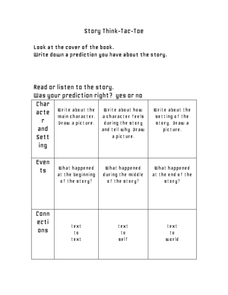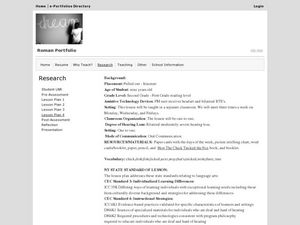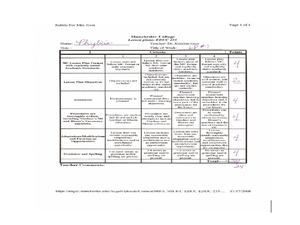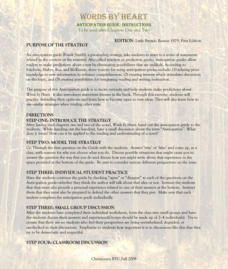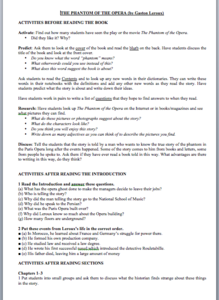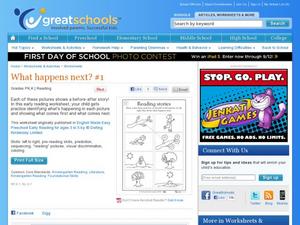Curated OER
Sentence Completion 13: Low-Advanced SAT Level
It's an erroneous assumption that vocabulary practice must be tedious. Rather than a draconian approach, tantalize your learners with a sentence completion exercise that will enthrall them. A detailed answer key makes the seemingly...
Curated OER
Story Think Tic Tac Toe
For this reading worksheet, learners look at the cover of a book and make a prediction about its contents. Students write about whether or not they were correct after reading the book. Learners choose one activity to complete in each row...
Curated OER
Guided Reading: Desert Life
First graders read a book with the teacher while encountering unfamiliar words and learning how to use context clues and visual clues to understand the material. For this reading comprehension lesson, 1st graders make predictions and...
Curated OER
Cloudy Days are for Reading and Writing
Students research weather proverbs and determine the scientific validity of 3 weather proverbs. They write an essay presenting their reasoning. They interview elderly people to graph the most frequently heard proverbs and theorize...
Curated OER
Chilling Predictions
Students research and prepare an almanac on the Arctic. They examine the laws that attempt to provide jurisdiction over this area and consider how these laws be affected if geography of the Arctic continues to change due to global warming.
Curated OER
Roman Portfolio
Student practice decoding skills and phonological awareness. In this vocabulary development lesson, student identifies new vocabulary through word association and flash cards. Student also reads How he Chick Tricked the Fox making...
Curated OER
The Merchant of Venice: Anticipation Guide
Is justice blind? Is love blind? Before beginning The Merchant of Venice, readers decide whether they agree or disagree with statements that encapsulate key elements of the tragic comedy. The class then predicts whether Shakespeare will...
Curated OER
Trouble with Trolls
Second graders read Trouble with Trolls. In this author/illustrator lesson, 2nd graders read a story and discuss their favorite parts. Students make predictions and connections to the book.
Curated OER
Probably Passage (Predicting)
Third graders practice predicting. In this prediction lesson plan, 3rd graders read a worksheet and they predict where 15 words will fit into the story. After they read the story, they discuss the similarities and differences between...
Curated OER
Fiction: Reading and Responding
Students respond and make predictions as they read an excerpt from The True Confessions of Charlotte Doyle. In this The True Confessions of Charlotte Doyle lesson plan, students read aloud and respond to questions that require them to...
Curated OER
James and the Giant Peach Comprehensive Guide
Each page of a comprehension packet that accompanies James and The Giant Peach requires learners to think, comprehend, focus on characters, make text-to-self and text-to-world connections, and build vocabulary through context. The...
Novelinks
Words By Heart: Anticipation Guide
The anticipation guide for Words by Heart is the first of a series of six, contains lesson plans for the activity as well as a handout to be completed individually, in pairs, or as a class. It sparks interest for the text and activates...
Novelinks
Touching Spirit Bear: Directed Thinking Activity
Can you guess what is going to happen in a story just by looking at the cover? Readers engage in a directed-reading activity in which they preview the text from Touching Spirit Bear by Ben Mikaelsen, read to find an answer, and re-read...
Curated OER
Parrot in the Oven: Problematic Situation
Prior to reading Victor Martinez's Parrot in the Oven: Mi Vida, class members are presented with a problematic situation and to rate their responses as well as predict the responses of a character from the novel.
Teach Engineering
Density Column Lab - Part 2
Groups suspend objects within layers of liquids to determine the densities of different liquids and compare them to the densities of objects calculated in Part 1. The groups then carefully test their calculations by layering the liquids...
BBC
The Sound Monster - Words That Make Sounds
There are words in the English language that actually make sounds, such as vroom, and, buzz. Here is a clever lesson plan which introduces young readers to these sound-making words. They play an interactive game on the computer that has...
Busy Teacher
The Phantom of the Opera
It's no masquerade! If Gaston Leroux's The Phantom of the Opera is part of your curriculum, check out this three-page packet loaded with suggestions for before, during, and after reading activities.
Tune Into English
Yellow Submarine – The Beatles – Notes
Enhance English language skills using the fan-favorite song, "Yellow Submarine" by The Beatles. Scholars predict what the song is about then listen and mark specific words they hear. Playing the song again, participants unscramble lyrics...
Novelinks
Where the Red Fern Grows: Graphic Organizer, Story Map
How do you grow a goal from a dream to reality? You make a plan! After reading chapters two and three of Where the Red Fern Grows, learners map how Billy earns his dogs by completing an organizer in pairs and then discussing answers in...
August House
The Magic Pot
The Magic Pot by Patricia Coombs is the theme of this multidisciplinary lesson plan. Early readers first take part in a read aloud and grand conversation about the story's details. Then, they get to work practicing their skills in...
Have Fun Teaching
Growing Seeds (9)
A seed, water, and sunlight. A seed, water, but no sunlight. A seed, sunlight, but no water. Young biologists are ask to infer what will happen to seeds given five different growing conditions.
Museum of Disability
Buddy, The First Seeing Eye Dog
Learn about how the seeing eye dog program began with a reading lesson about Eva Moore's chapter book, Buddy, The First Seeing Eye Dog. With vocabulary words, discussion questions, and extension resources, the lesson is a great way for...
Museum of Disability
Don't Call Me Special
Introduce young learners to the idea of disabilities and making friends with children who are different than they are. Using Don't Call Me Special - A First Look at Disability by Pat Thomas, learners are guided through the new vocabulary...
Curated OER
What Happens Next? 1
Knowing how to sequence events means you have to know what happens before and after. Little ones draw a line from four before images to the images that show what happened next. This is a good challenge for your youngest learners.



